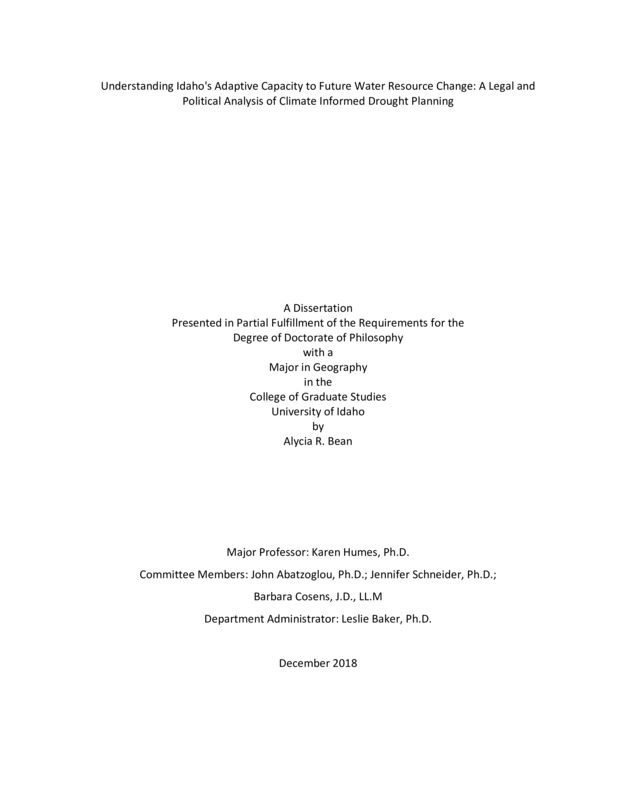Understanding Idaho's Adaptive Capacity to Future Water Resource Change: A Legal and Political Analysis of Climate Informed Drought Planning
Bean, Alycia R.. (2018-12). Understanding Idaho's Adaptive Capacity to Future Water Resource Change: A Legal and Political Analysis of Climate Informed Drought Planning. Theses and Dissertations Collection, University of Idaho Library Digital Collections. https://www.lib.uidaho.edu/digital/etd/items/bean_idaho_0089e_11199.html
- Title:
- Understanding Idaho's Adaptive Capacity to Future Water Resource Change: A Legal and Political Analysis of Climate Informed Drought Planning
- Author:
- Bean, Alycia R.
- ORCID:
- 0000-0002-6854-8967
- Date:
- 2018-12
- Keywords:
- adaptive planning agenda setting climate change drought Idaho water rights
- Program:
- Geography
- Subject Category:
- Geography
- Abstract:
-
Geography is a unique discipline of study. From the classic geographical analysis of exploration (completing the mapping of the world), to focusing on the generalities (explaining patterns of human placement and behavior), to regional focus (with less structured explanations than the general), geography has provided diverse ways of knowing. And while ‘ways of doing’ have changed between idiographic and nomothetic, or have focused more on explaining causality or complimenting scientific modeling, the approaches build on the other’s strengths. These foundational developments need both the rigor of spatial and statistical analysis as well as the rich and in depth investigations of exploratory chorography. Geography provides the holistic analytical means to better understand the complexities we face in the 21st century.
There is no more intractable problem of our time than climate change. The impact from increased greenhouse gases has and will continue to pervade every aspect of our lives. Changes to the physical environment affect our economic, political and legal environs as well. In the northwestern state of Idaho some of the most significant impacts of climate change will be seen through water availability. In a snow-rain mixed dominated region increasing temperatures have cascading effects on water resources. Compounding this biophysical issue is the legal issue of water allocation which, in portions of the state, is already over allocated. Meaning, there is already not enough water to satisfy all water rights at certain times of the year in certain locations. Climate change impacts only exacerbate complex water law agreements. The state’s document to provide valuable and up-to-date information for Idaho citizens in times of water shortage is now seventeen years old. This outdated state Drought Plan is not for lack of drought in the state. Idaho counties have declared drought eleven out of the past fifteen years (2001 – 2016). Understanding why the slow-onset hazard of drought isn’t able to garner the attention of policy makers in the state like other natural hazards, such as fast acting floods or landslides, is imperative to getting drought on the agendas of policy elites.
An examination of geography’s role in addressing climate change through geographic thought is woven through the need for this study and the implications of the research (Chapter 1). The dissertation utilizes spatial and statistical analysis to better understand how hydrometeorological and agricultural drought has influenced Idahoans through a climatological drought metric (Palmer Drought Severity Index) and through a political drought metric (county-level drought declarations) (Chapter 2). Drought declarations in Idaho allow for an expedited temporary water transfer process, often providing the much- needed alternative to resolve water shortage issues outside of litigation. One of the most stalwart examples of out of court settlements in the region occurred in southern Idaho in 2015. An adaptive planning framework is applied to the settlement between ground and surface water users to identify areas of flexibility within the stable role of law (Chapter 3). While law has room for adaptability, drought planning must be on the agenda of policy makers in order to advance. Borrowing from the agenda setting literature within political science, this research examines the process of state level drought policy. A window of opportunity opens for policy change when a set of criteria is met. This study demonstrates how the slow onset hazard of drought resists classic policy analysis due to its unique characteristics set within Idaho’s unique demographic (Chapter 4). The dissertation concludes with a summary of research findings and recommendations for future work (Chapter 5).
The objective of this research follows the tradition of geographic study of humans and their interaction with the landscape. This paper utilizes an interdisciplinary approach to the complex and integrated water resource issues facing the semi-arid state of Idaho. The central conclusion of the dissertation leans on the studies of climatology, water law and policy analysis to argue that the study of a intractable issue like climate change, seen here through drought specifically, cannot be considered as an autonomous field of inquiry.
- Description:
- doctoral, Ph.D., Geography -- University of Idaho - College of Graduate Studies, 2018-12
- Major Professor:
- Humes, Karen
- Committee:
- Cosens, Barb; Abatzoglou, John; Schneider, Jen
- Defense Date:
- 2018-12
- Identifier:
- Bean_idaho_0089E_11199
- Type:
- Text
- Format Original:
- Format:
- application/pdf
- Rights:
- In Copyright - Educational Use Permitted. For more information, please contact University of Idaho Library Special Collections and Archives Department at libspec@uidaho.edu.
- Standardized Rights:
- http://rightsstatements.org/vocab/InC-EDU/1.0/

